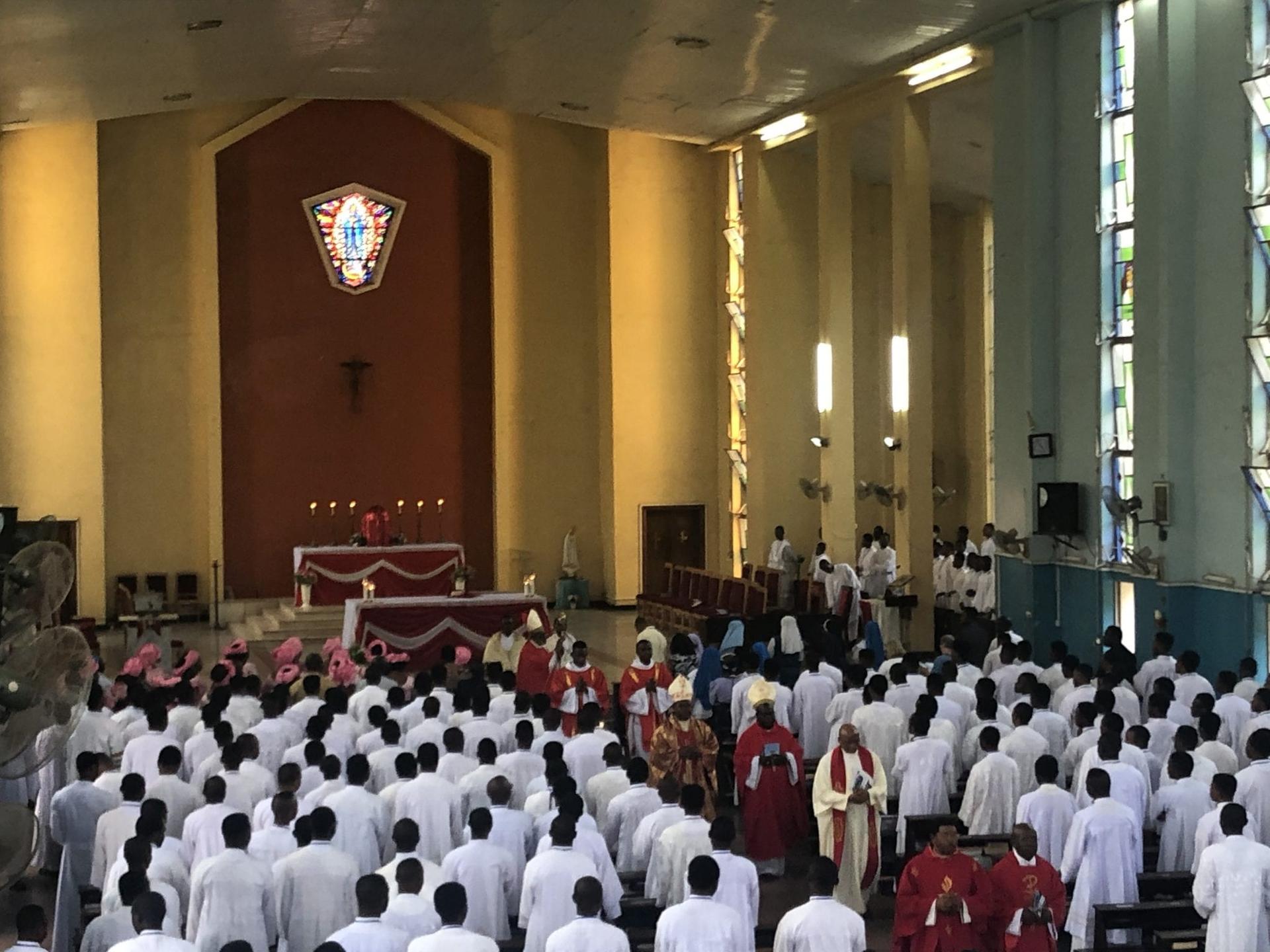ENUGU, Nigeria — A much-anticipated Pan-African Congress opened on Thursday with a plea for justice, both for the continent and its people.
In the inaugural Mass on the grounds of Bigard Memorial Seminary, Archbishop Charles Palmer-Buckle of Cape Coast, Ghana, encouraged the 80 delegates to seek justice “not from law courts…but justice, which comes through Jesus Christ.”
“Jesus is the one who will bring forth justice to the nations,” said Palmer-Buckle, insisting only once a faith in Jesus is secured “can we go forward…to bring his meekness, tenderness, and justice.”
The seminary in Enugu is the world’s largest Catholic training ground for priests with a current enrollment of 855 seminarians, many of whom were on hand for the congress’s opening events. Their snow-white cassocks offered a sharp contrast from the chapel’s sunny blue, orange, and yellow walls.
During his homily, the 69-year-old prelate, who has served as a critical voice in both Ghana and beyond as an intermediary between various political and religious factions, spoke directly to the young men saying that when he was young, his professors told him he didn’t have the chops to become a priest. He told the men on hand not to give up in their vocations as the work of priests is more essential than ever.
RELATED: Watershed congress to spotlight poor Africans ‘hanging on the cross’
The theme of the four-day Pan-African Congress on Theology, Society, and Pastoral Life — “What Must We do to Perform the Works of God?” — was elevated by all of the speakers during the opening day’s festivities.
Father Albert Ikpenwa, rector of Bigard, told the crowd that both “human events and social confusion” are “tempting faith,” citing materialism and social and political crises that have challenged the Church.
Even so, he said the tremendous growth of the Church in Africa, as evidenced by the number of priests, bishops, and candidates for consecrated life, give proof to Pope Benedict XVI’s words that Africa is a “continent of hope.”
“The history of Catholicism cannot be properly written without giving prominence to the advent and growth of the Church in Africa in its pages,” he said, encouraging participants to further a theology of hope and a pastoral life that reflects that spirit.
Looking ahead to the panel discussions that will take place during the conference, Father Stan Chu Ilo, the primary convener for the congress, said that the goal is to discover what it means to be an “authentic and faithful Christian — Catholic, African, Ebo, Nigerian, and at multiple levels.”
“This is a lot of heavy lifting we have to do,” adding that reverence and dialogue between the Church and the world around it is at the heart of the congress.
Ilo went on to cite an incident from October where a traditionalist Catholic stole indigenous statues from a Roman church during the Synod of Bishops on the Amazon in Rome, called the “Pachamama,” labeling them pagan idols.
“We must reverence these cultural traditions,” he told attendees at a press conference on Thursday, noting that he hopes the congress offers a better model of respectful engagement.
The cultural offerings of the African Church were on full display on Thursday with a range of music and traditional dancing by the seminarians during the opening ceremony — which at one point included Palmer-Buckle and Bishop George Desmond Tambala of Zomba, Malawi joining in on the action, much to the delight of the roaring crowd.
Professor Bill Cavanaugh, head of the Center for World Catholicism and Intercultural Theology, at DePaul University, a co-sponsor of the congress, told attendees that the center, which focuses on the global south, has a particular interest in Africa.
While Cavanaugh said that the African Church’s rapid growth over the last century and the fact that it represents the future of Catholicism are worthy motivations, the main reason is that “you can feel the presence of God here.”
Follow Christopher White on Twitter: @cwwhite212
Crux is dedicated to smart, wired and independent reporting on the Vatican and worldwide Catholic Church. That kind of reporting doesn’t come cheap, and we need your support. You can help Crux by giving a small amount monthly, or with a onetime gift. Please remember, Crux is a for-profit organization, so contributions are not tax-deductible.












